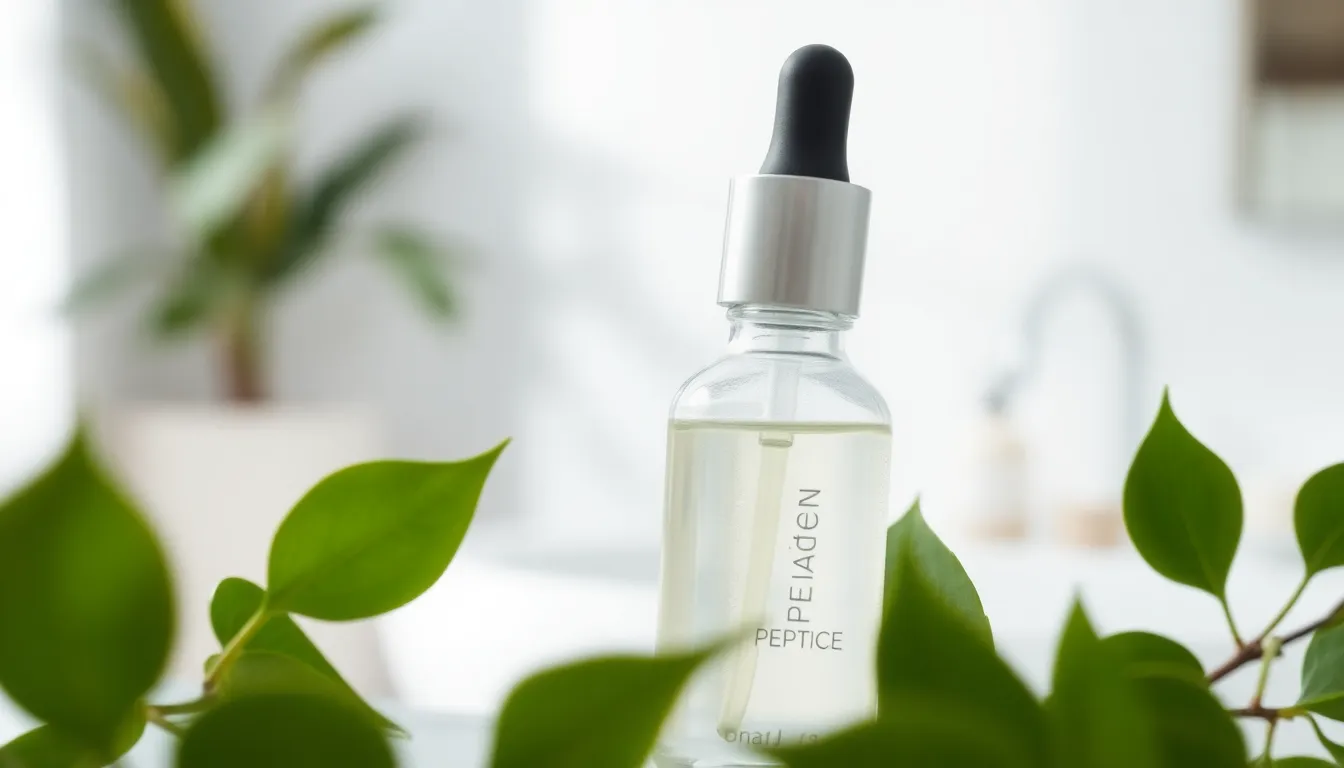In the ever-evolving world of skincare, peptide serums are stealing the show, and for good reason. These tiny powerhouses pack a punch, promising to boost collagen production and smooth out those pesky fine lines. Who wouldn’t want to turn back the clock while sipping their morning coffee?
Table of Contents
ToggleOverview of Peptide Serums
Peptide serums capture attention in skincare due to their ability to enhance skin health and appearance. These products focus on powerful ingredients known for their anti-aging benefits.
What Are Peptides?
Peptides consist of short chains of amino acids, which serve as the building blocks of proteins in the body. They signal skin cells to perform specific functions, like producing collagen. Various types of peptides exist, such as signal peptides, carrier peptides, and enzyme-inhibiting peptides, each targeting distinct skin concerns. Many skincare brands incorporate peptides into formulations to improve efficacy and boost overall skin quality.
Benefits of Using Peptide Serums
Utilizing peptide serums offers multiple advantages for skin health. Enhanced collagen production helps maintain skin’s firmness and elasticity. Fine lines and wrinkles often diminish with regular use, promoting a smoother complexion. Hydration improves as peptides strengthen the skin’s barrier function. Additionally, products containing peptides can soothe inflammation and enhance overall skin tone, leading to a more youthful appearance. Regular applications yield significant visible improvements, making peptide serums a valuable addition to skincare routines.
Types of Peptide Serums

Peptide serums come in various types, each designed for specific skin benefits. Understanding these types helps individuals select the right serum for their skincare goals.
Signal Peptides
Signal peptides play a crucial role in enhancing skin functions. They communicate directly with skin cells, stimulating processes like collagen and elastin production. These peptides promote rejuvenation and improve skin texture. Regular use of signal peptides can lead to firmer, smoother skin, effectively reducing the appearance of wrinkles and fine lines.
Carrier Peptides
Carrier peptides serve as transporters, delivering essential minerals and nutrients. They facilitate the absorption of other beneficial ingredients within skincare products. Collaboration with other actives enhances the overall effectiveness of a serum. Users often notice improved hydration and skin barrier function when incorporating carrier peptides into their routines.
Enzyme-Inhibiting Peptides
Enzyme-inhibiting peptides focus on reducing the breakdown of collagen and elastin in the skin. They act by blocking enzymes known to accelerate skin aging. As a result, these peptides help maintain skin’s firmness and elasticity. Incorporating enzyme-inhibiting peptides can lead to a visibly youthfully radiant complexion.
How to Use Peptide Serums
Using peptide serums effectively enhances their benefits. Proper application techniques and a suitable frequency contribute to achieving optimal results.
Application Techniques
First, cleanse the skin with a gentle cleanser. Next, pat the skin dry. Following this, apply a few drops of peptide serum to the palm. Then, spread the serum evenly between the fingertips. Gently massage it into the skin using upward circular motions. Focus on areas with visible fine lines or aging signs. Allow the serum to absorb fully before applying additional products. Combining the serum with a moisturizer locks in the benefits. Ensure sunscreen is applied during the daytime for added protection.
Recommended Frequency
Using peptide serums daily maximizes their effectiveness. They can be applied in the morning and evening for best results. For beginners, starting with every other day allows the skin to adjust. Gradually increase to daily use as tolerated. Consistency is key for achieving long-term improvements. Monitoring skin’s response ensures optimal usage tailored to individual needs. Adjust application based on skin type and sensitivity.
Scientific Research on Peptide Serum Usage
Numerous studies investigate the effectiveness of peptide serums in skincare. These clinical evaluations demonstrate positive outcomes in skin rejuvenation and enhancement.
Clinical Studies
Research consistently shows that peptide serums improve skin elasticity and hydration. A study published in the Journal of Cosmetic Dermatology found that participants experienced a 30% increase in skin elasticity after 12 weeks of peptide serum use. Additionally, clinical trials report reduced appearance of fine lines and wrinkles in users. Participants noted visible improvements, particularly in skin smoothness and firmness. Another study indicated that signal peptides significantly boosted collagen production, supporting overall skin structure. These findings emphasize the potential of peptide serums as an essential component of effective skincare regimens.
User Testimonials
User feedback highlights the transformative impact of peptide serums. Many individuals express satisfaction with their skin’s texture and overall appearance after consistent use. One user remarked on a noticeable reduction in fine lines within four weeks. Others mention enhanced hydration, leading to a healthier glow. Many testimonials point to improved skin tone and firmness, validating scientific claims. For instance, a reviewer shared their experience of smoother skin after integrating peptide serum into their routine. Overall, these testimonials reinforce the efficacy of peptide serums in achieving youthful, vibrant skin.
Potential Side Effects and Considerations
Users should consider potential side effects when incorporating peptide serums into their skincare routines. Awareness of skin reactions and allergic responses is essential for maintaining skin health.
Skin Reactions
Skin reactions may occur when using peptide serums. Redness, irritation, or dryness can manifest, particularly in individuals with sensitive skin. Users should apply a patch test before full usage to minimize adverse effects. Observing skin for any unexpected changes helps identify problematic ingredients. Over time, most individuals adapt to the serum, experiencing improved skin texture and appearance. However, stopping usage and consulting a dermatologist is advisable if significant reactions arise. Regular monitoring allows for tailoring application methods to individual skin types.
Allergic Responses
Allergic responses to peptide serums can arise in some individuals. Symptoms may include itching, hives, or swelling in affected areas. Identifying ingredients that trigger allergies is crucial for preventing reactions. Reading product labels thoroughly helps users avoid known allergens. In cases of serious allergic reactions, seeking medical attention becomes necessary. Individuals with a history of skincare allergies should approach peptide serums cautiously. Gradual introduction of serums into the skincare routine allows users to gauge tolerance effectively.
Peptide serums represent a significant advancement in skincare technology. Their ability to stimulate collagen production and improve skin elasticity makes them a go-to choice for those seeking youthful skin. With consistent use and proper application techniques, users can experience transformative results.
It’s essential to tailor the application of these serums to individual skin types while remaining mindful of potential reactions. Monitoring skin’s response ensures that each person can maximize the benefits of peptide serums. By incorporating these powerful formulations into daily routines, individuals can achieve a radiant and rejuvenated complexion.






